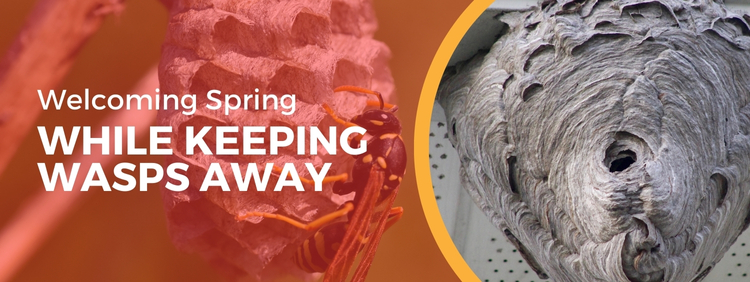Welcoming Spring While Keeping Wasps At Bay: Top Tips From Truly Nolen Cambridge

With the arrival of spring, flowers aren’t the only ones making an exciting comeback. Many homeowners can relate to the unexpected buzz of uninvited guests – wasps! While adding to the energy and colour of the season, these creatures can also bring an unwanted sting.
The purpose of this blog is to empower you as a homeowner by providing you with comprehensive insights on dealing with wasps. We will guide you to identify signs of an infestation, inform you about the potential dangers, and provide you with the top five effective tips to keep these unwelcomed guests at bay. We will also explore the advantages of hiring a professional service for pest control in Cambridge.
The conclusion will depict how we, a group of experienced pest control professionals, are your best pick for managing any persistent stingy invaders.
What are the Signs of a Wasp Infestation?
It’s a delightful experience to witness the arrival of spring with all its resplendent beauty. While you might be ready to enjoy the warmer weather, there’s a considerable downside to it; an increase in the presence of wasps around your property. Although they play an important part in our ecosystem, a nest in or near your home can pose a significant risk to you and your family’s well-being.
Recognizing the signs of an infestation early can save you a lot of trouble down the line. Let’s investigate the signs that you need to watch out for:
- Visible Wasps: This might seem obvious, but the first sign of an infestation is often seeing more around your property. A few here and there might not seem like a big deal, but it could mean there’s a nest close by.
- Nests: Wasps build nests from chewed wood pulp, making them papery and grey. They usually hide their nests in sheltered areas like under eaves, in loft spaces, garden sheds or garages. If you spot one around your property, it’s a clear sign of an infestation.
- Increased Activity: Watch out for the flurry of activity, especially around dawn and dusk. This could indicate a nearby nest.
- Audible Buzzing: They often make a buzzing noise when moving to and from a nest. If you hear this inside your walls or attic, it’s a strong indication of a nest inside your home.
- Damage to Wood Structures: Wasps chew wood to make their nests. If you notice your wooden fence, deck or other similar structures suddenly missing or looking chewed up, it could suggest a nearby nest.
Infestations can escalate quickly, so be vigilant and proactive. If you notice any of these indicators, it’s time to consider wresting back control of your property. It might be tempting to deal with it yourself, but let us assure you, wasp control isn’t a DIY project. Sometimes, the safer approach is to let the professionals handle the situation.
What are the Dangers of a Wasp Infestation?
Wasps, while an integral part of our ecosystem, can pose several risks when they make your home their nesting ground. The danger goes beyond the discomfort of having them around, extending into potential serious health and safety threats. It’s important to realize control is not merely about maintaining a pest-free environment, but it’s also about keeping you, your family, and your pets safe.
Wasp Sting
Wasps are notorious for their painful stings. Unlike bees that can only sting once, they can sting multiple times and each sting injects a dose of venom containing various toxins that cause pain and inflammation. This can be particularly distressing if you or a family member is allergic. The body’s response to a sting can range from mild local reactions to more severe systemic allergic responses such as anaphylaxis, which can even be life-threatening.
Secondary Infections
Following a wasp sting, secondary infections can occur due to scratching or improper at-home treatments. Itchy, red welts can become infected and lead to cellulitis, a common but potentially serious bacterial skin infection.
Wasp Nesting Dangers
Wasps typically build their nests in secluded areas, which could include quiet corners of your house, garden sheds, garages, or in the ground. Disturbing a nest can provoke wasps to attack in a swarm, posing a substantial risk to those in the vicinity.
Structural Damage to your Home
Although not as destructive as termites, some wasp species burrow into wood to nest or hibernate, over time causing noticeable damage. This can lead to costly repairs if left untreated.
Pet Safety
Our four-legged family members are at risk too. Curious pets can be a target for wasps as they sniff around their nests, and a sting can be as harmful to them as it is to humans.
An infestation is not a challenge to take lightly. While we might understand how to control wasps, it’s certainly not a job for the inexperienced because the consequential perils are far too great. It pays to invest in professional help, such as our experts who specialize in pest control.
What are the Top 5 Tips to Keep Wasps at Bay in Spring?

As spring approaches, we can’t help but relish in the return of warm weather and blooming flowers. However, the advent of this beautiful season also brings with it the reappearance of our buzzing friends. Luckily, our experts at the forefront are here to share some top-notch, tried and tested strategies to help make your spring wasp-free.
1. Properly Seal Your Home
No matter how inviting your home might seem to wasps, you can drastically reduce their chance of entry by simply taking measures to seal it properly. This includes closing off any cracks or crevices in your walls, sealing windows and doors tightly and repairing or replacing any damaged window or door screens.
2. Maintain Your Garden
Wasps are attracted to decaying plant matter. By maintaining a clean garden, free of fallen fruits and rotten foliage, you reduce the allure your garden might have, making it less likely for them to establish a nest.
3. Cover Food and Trash
Wasps, like many insects, are attracted to human food and waste. Make it a point to keep stored food tightly sealed, clean up after outdoor meals promptly and ensure trash cans have tightly secured lids.
4. Limit Water Sources
Wasps require water to survive. If you have bird baths or pet water bowls outside, it’s advisable to keep them empty when not in use. Also, fix any leaky taps or pipes to restrict their water supply.
5. Use Natural Repellents
Plants such as wormwood, marigold, and citronella are known to repel wasps. Consider planting these in your garden or using their essential oils around doorways or windows in your home as a natural deterrent.
Note that while these preventive measures can significantly reduce the presence of wasps, they are not foolproof. In case of persistent activity or an infestation, seeking professional help is highly recommended.
What are the Benefits of Hiring a Pest Control Service?
Opting for professional pest control is an excellent way to ensure the safety and well-being of your home. It gives you the benefit of a thorough assessment, a specialized strategy for your particular infestation, and high-quality interventions that are safe and efficient. Ultimately, this means peace of mind in a wasp-free home environment. Let’s delve further into the advantages of employing such a service.
Expert Evaluation and Treatment
Professionals bring with them years of experience and a deep understanding of wasp behaviour. They can identify the most subtle signs of an infestation, determine the severity, and establish an effective treatment plan. They have access to advanced technology and effective products for control which may not be readily available for homeowners.
Personal Safety
Taking pest control into your own hands is a risky endeavour. Wasps can become aggressive when their nests are disturbed, resulting in painful stings. Moreover, a sting can be life-threatening, especially for those with allergies. By hiring professionals, you are ensuring your well-being and are spared from potential harm.
Preventive Measures and Follow-ups
After the elimination of the wasps, the work isn’t done. Preventing a future infestation is just as important as removing the current one. A professional service not only treats the existing issue but also offers advice and solutions to prevent future infestations. They usually carry out follow-ups to ensure the effectiveness of treatment and to make any necessary adjustments.
Time and Cost-Effective Solution
Think of the time, effort, and resources you would have to spend to deal with wasps on your own. Now, consider what it would cost to hire us. When balanced, the benefit of professional help becomes clear. You’ll end up saving more, in the long run, thanks to the effectiveness and precision of professional pest control.
The Right Company for the Job
Choosing the right pest control company makes all the difference. The team at Truly Nolen Canada has the skill, knowledge, and specialized equipment to deal with wasps and other pests effectively. We combine industry-leading techniques with home-grown experience, ensuring each customer’s needs are met with speed, professionalism, and, of course, successful results.
To ensure your home is pest-free, contact us to schedule an inspection and learn more about our comprehensive pest control solutions. Embrace the bloom of spring without the worry of invasions. With our help, you can control wasps in a safe, professional manner.